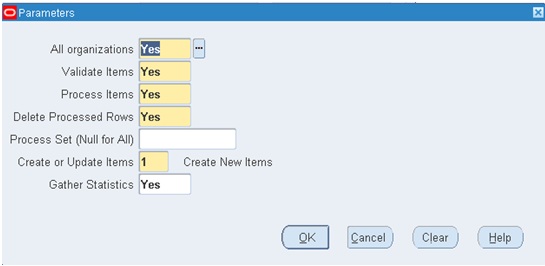FND in Oracle:
1. FND is short for “Foundation” which was the name Oracle initially
wanted to use for the Application Object Library- the application with common
components shared between all the other applications in the Oracle E-Business
Suite.
Profile Options:
Source:
FNDLOAD apps/apps O Y DOWNLOAD
$FND_TOP/patch/115/import/afscprof.lct XXPRNAME.ldt PROFILE
PROFILE_NAME="XXPRNAME" APPLICATION_SHORT_NAME="PN"
Target:
1. FNDLOAD apps/apps O Y UPLOAD
$FND_TOP/patch/115/import/afscprof.lct XXPRNAME.ldt
2. FNDLOAD apps/apps 0 Y UPLOAD_PARTIAL
$FND_TOP/patch/115/import/afscprof.lct XXPRNAME.ldt PROFILE PROFILE_NAME="
XXPRNAME" APPLICATION_SHORT_NAME="PN"
Forms:
Source:
FNDLOAD apps/apps O Y DOWNLOAD
$FND_TOP/patch/115/import/afsload.lct XXFRMNAME.ldt FORM
APPLICATION_SHORT_NAME="PN" FORM_NAME="XXFRMNAME"
Target:
FNDLOAD apps/apps 0 Y UPLOAD
@FND:patch/115/import/afsload.lct XXFRMNAME.ldt
Functions:
Source:
FNDLOAD apps/apps O Y DOWNLOAD
$FND_TOP/patch/115/import/afsload.lct XXFUNNAME.ldt FUNCTION
FUNC_APP_SHORT_NAME="PN" FUNCTION_NAME="XXFUNNAME"
Target:
FNDLOAD apps/apps O Y UPLOAD
@FND:patch/115/import/afsload.lct XXFUNNAME.ldt
Menus:
Source:
FNDLOAD apps/apps O Y DOWNLOAD
$FND_TOP/patch/115/import/afsload.lct XXMNNAME.ldt MENU
MENU_NAME="XXMNNAME"
Target:
FNDLOAD apps/apps 0 Y UPLOAD
@FND:patch/115/import/afsload.lct XXMNNAME.ldt
Responsibilities:
Source:
FNDLOAD apps/apps O Y DOWNLOAD $FND_TOP/patch/115/import/afscursp.lct
XXRESNAME.ldt FND_RESPONSIBILITY RESP_KEY="XXRESNAME"
Target:
1. FNDLOAD apps/apps O Y UPLOAD
$FND_TOP/patch/115/import/afscursp.lct XXRESNAME.ldt
2. FNDLOAD apps/apps 0 Y UPLOAD_PARTIAL
$FND_TOP/patch/115/import/afscursp.lct XXRESNAME.ldt FND_RESPONSIBILITY
RESP_KEY="XXRESNAME" APPLICATION_SHORT_NAME="PN"
Request
Groups:
Source:
FNDLOAD apps/apps O Y DOWNLOAD
$FND_TOP/patch/115/import/afcpreqg.lct XXRQGNAME.ldt REQUEST_GROUP
REQUEST_GROUP_NAME="XXRQGNAME" APPLICATION_SHORT_NAME="PN"
Target:
1. FNDLOAD apps/apps O Y UPLOAD
$FND_TOP/patch/115/import/afcpreqg.lct XXRQGNAME.ldt
2. FNDLOAD apps/apps 0 Y UPLOAD_PARTIAL
$FND_TOP/patch/115/import/afcpreqg.lct XXRQGNAME.ldt REQUEST_GROUP
REQUEST_GROUP_NAME="XXRQGNAME" APPLICATION_SHORT_NAME="PN"
Request
Sets:
Source:
Step1:
FNDLOAD apps/apps 0 Y DOWNLOAD
$FND_TOP/patch/115/import/afcprset.lct XXRQSNAME.ldt REQ_SET
REQUEST_SET_NAME="XXRQSNAME"
Step2:
FNDLOAD apps/apps 0 Y DOWNLOAD
$FND_TOP/patch/115/import/afcprset.lct XXRQSLNAME.ldt REQ_SET_LINKS
REQUEST_SET_NAME="XXRQSNAME"
Target:
Step1:
FNDLOAD apps/apps 0 Y UPLOAD
$FND_TOP/patch/115/import/afcprset.lct XXRQSNAME.ldt
Step2:
FNDLOAD apps/apps 0 Y UPLOAD
$FND_TOP/patch/115/import/afcprset.lct XXRQSLNAME.ldt
Lookups:
Source:
FNDLOAD apps/apps O Y DOWNLOAD
$FND_TOP/patch/115/import/aflvmlu.lct XXLKPNAME.ldt FND_LOOKUP_TYPE
APPLICATION_SHORT_NAME="PN" LOOKUP_TYPE="XXLKPNAME"
Target:
1. FNDLOAD apps/apps 0 Y UPLOAD aflvmlu.lct
XXLKPNAME.ldt
2. FNDLOAD apps/apps 0 Y UPLOAD_PARTIAL
$FND_TOP/patch/115/import/aflvmlu.lct XXLKPNAME.ldt FND_LOOKUP_TYPE
LOOKUP_TYPE="XXLKPNAME" APPLICATION_SHORT_NAME="PN"
Value
Sets:
Source:
FNDLOAD apps/apps O Y DOWNLOAD
$FND_TOP/patch/115/import/afffload.lct XXVALSNAME.ldt VALUE_SET
FLEX_VALUE_SET_NAME="XXVALSNAME"
Target:
1. FNDLOAD apps/apps 0 Y UPLOAD afffload.lct XXVALSNAME.ldt
2. FNDLOAD apps/apps 0 Y UPLOAD_PARTIAL
$FND_TOP/patch/115/import/afffload.lct XXVALSNAME.ldt VALUE_SET
FLEX_VALUE_SET_NAME="XXVALSNAME"
APPLICATION_SHORT_NAME="PN"
Descriptive
Flex-fields:
Source:
FNDLOAD apps/apps O Y DOWNLOAD $FND_TOP/patch/115/import/afffload.lct
XXDFFNAME.ldt DESC_FLEX P_LEVEL='COL_ALL:REF_ALL:CTX_ONE:SEG_ALL'
APPLICATION_SHORT_NAME="PN"
DESCRIPTIVE_FLEXFIELD_NAME="PN_LEASE_DETAILS"
P_CONTEXT_CODE="Global Data Elements"
Target:
FNDLOAD apps/apps 0 Y UPLOAD @FND:patch/115/import/afffload.lct
XXDFFNAME.ldt
Key
Flex-fields:
Source:
FNDLOAD apps/apps O Y DOWNLOAD
$FND_TOP/patch/115/import/afffload.lct XXKFFNAME.ldt KEY_FLEX
P_LEVEL=’COL_ALL:FQL_ALL:SQL_ALL:STR_ONE:WFP_ALL:SHA_ALL:CVR_ALL:SEG_ALL’
APPLICATION_SHORT_NAME="FND" ID_FLEX_CODE="key flex code"
P_STRUCTURE_CODE="structure name”
Target:
FNDLOAD apps/apps 0 Y UPLOAD
@FND:patch/115/import/afffload.lct XXKFFNAME.ldt
Concurrent
Programs:
Source:
FNDLOAD apps/apps O Y DOWNLOAD
$FND_TOP/patch/115/import/afcpprog.lct XXCPNAME.ldt PROGRAM
APPLICATION_SHORT_NAME="PN"
CONCURRENT_PROGRAM_NAME="XXCPNAME"
Target:
1. FNDLOAD apps/apps 0 Y UPLOAD
@FND:patch/115/import/afcpprog.lct XXCPNAME.ldt
2. FNDLOAD apps/apps 0 Y UPLOAD_PARTIAL
$FND_TOP/patch/115/import/afcpprog.lct XXCPNAME.ldt PROGRAM
CONCURRENT_PROGRAM_NAME="XXCPNAME"
APPLICATION_SHORT_NAME="PN"
Form
Personalization:
Source:
FNDLOAD apps/apps 0 Y DOWNLOAD
$FND_TOP/patch/115/import/affrmcus.lct XXFPNAME.ldt FND_FORM_CUSTOM_RULES
function_name="XXFPNAME"
Target:
FNDLOAD apps/apps 0 Y UPLOAD
$FND_TOP/patch/115/import/affrmcus.lct XXFPNAME.ldt
FND
Users:
Source:
FNDLOAD apps/apps 0 Y DOWNLOAD
$FND_TOP/patch/115/import/afscursp.lct ./XXUSERNAME.ldt FND_USER
USER_NAME='XXUSERNAME'
Target:
FNDLOAD apps/apps 0 Y UPLOAD
$FND_TOP/patch/115/import/afscursp.lct ./ XXUSERNAME.ldt
Printer
Styles:
Source:
FNDLOAD apps/apps O Y DOWNLOAD
$FND_TOP/patch/115/import/afcppstl.lct XXPRSTYLE.ldt STYLE
PRINTER_STYLE_NAME="XXPRSTYLE"
Target:
FNDLOAD apps/apps 0 Y UPLOAD
$FND_TOP/patch/115/import/afcppstl.lct XXPRSTYLE.ldt
Some useful Meta-link Notes related to FNDLOAD:
1. For NLS Language using FNDLOAD:
Note: 434724.1
2. Troubleshooting Incorrect translation with FNDLOAD
Note: 299080.1
Note:
1. Test FNDLOAD commands multiple times in multiple instances
before running into PROD instances.
2. UPLOAD_PARTIAL is used to modify existed programs.
3. Execution sequence is important ex: To create a
responsibility à Create Formà Create Function à Create Menu à Create
Responsibility
